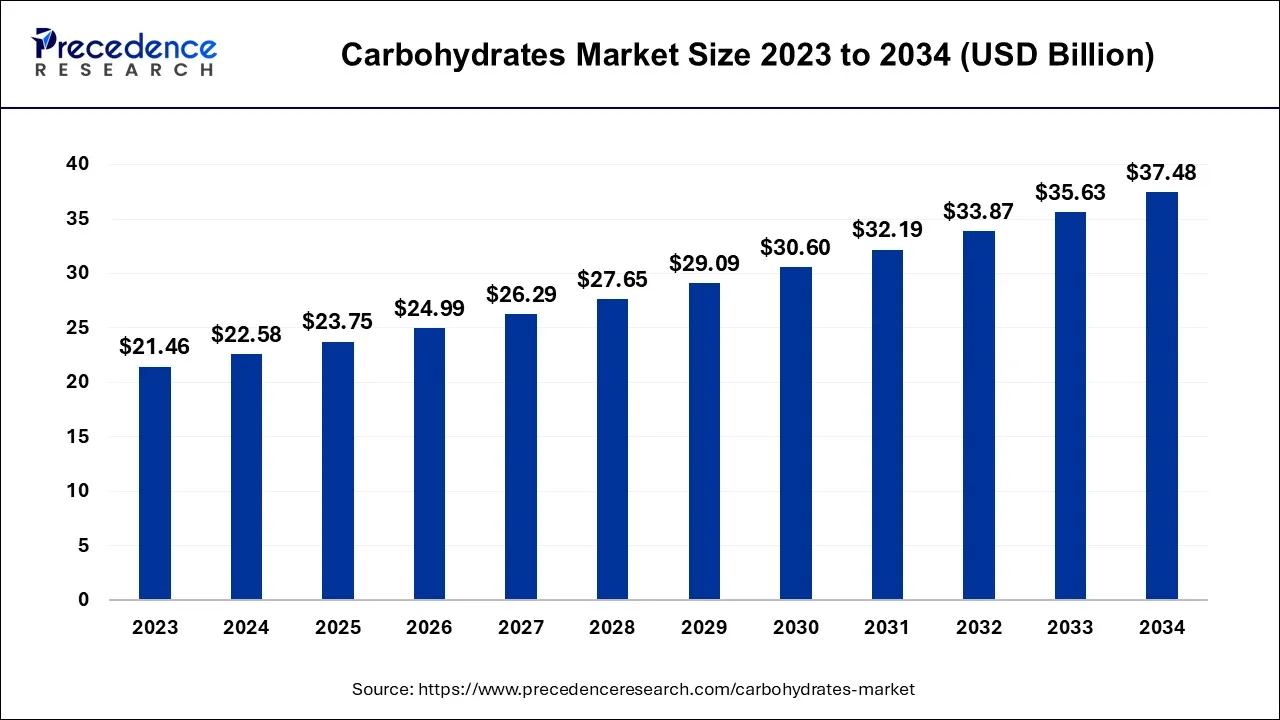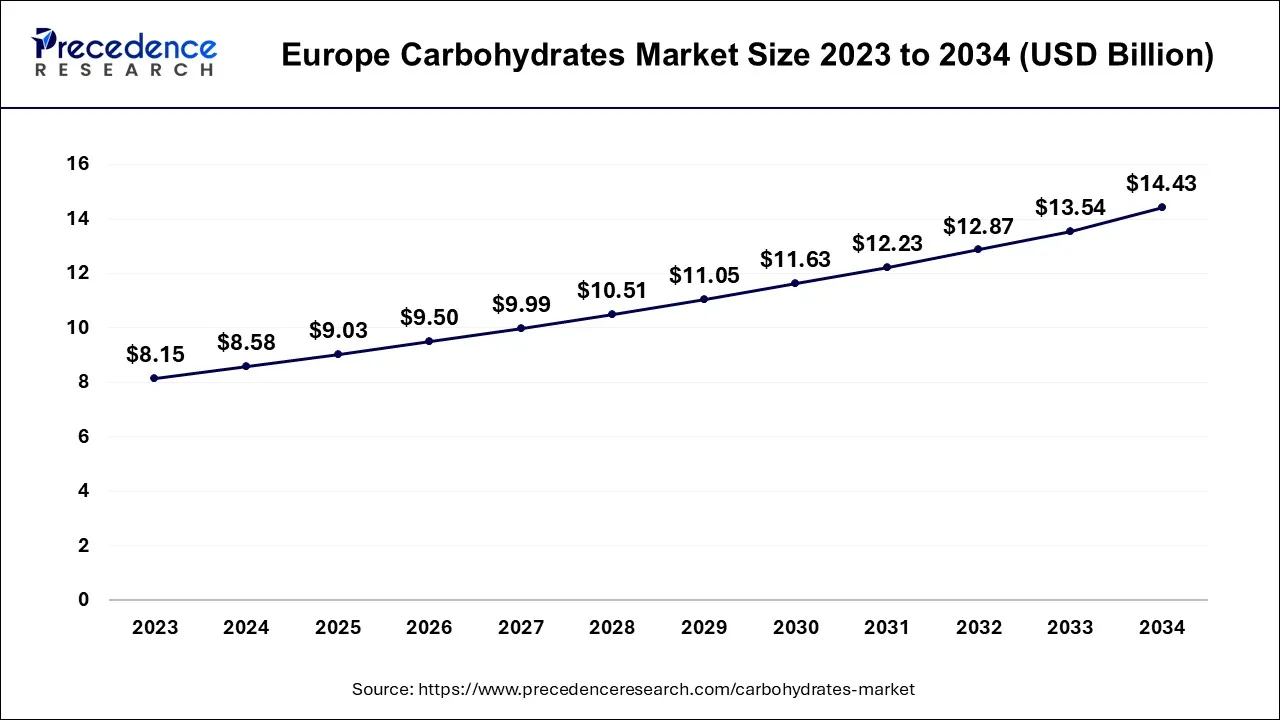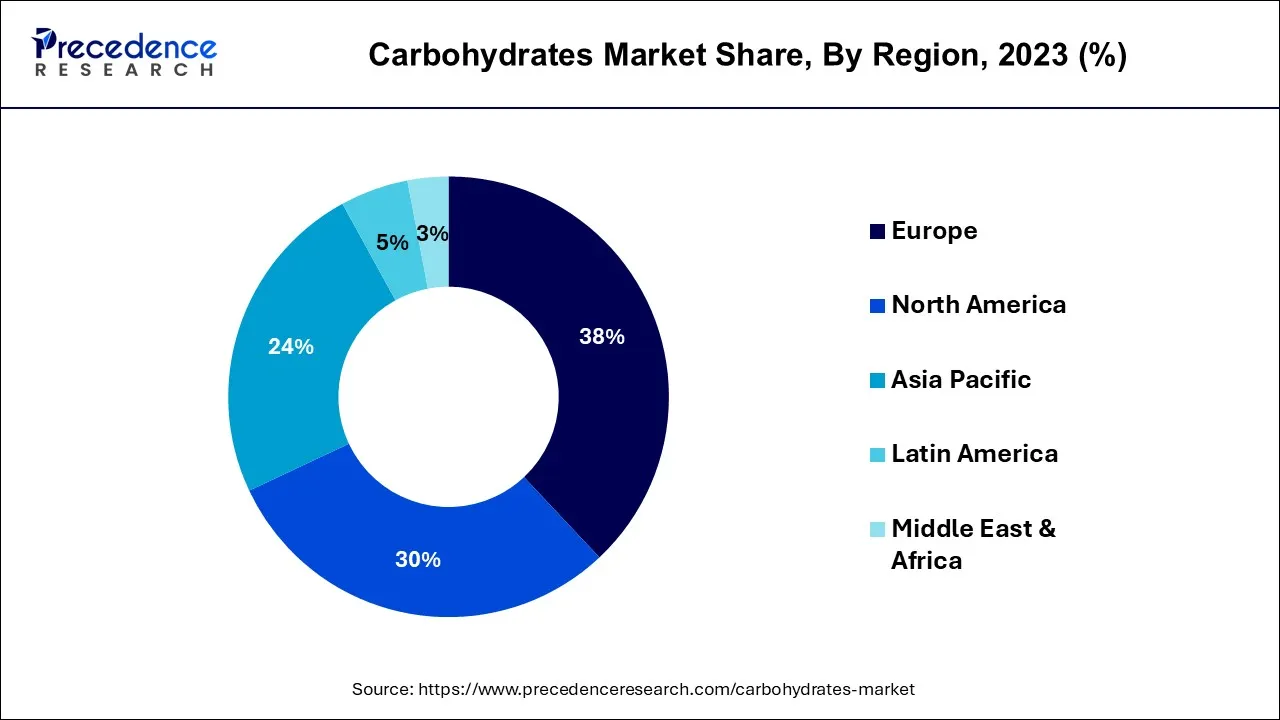The global carbohydrates market size is calculated at USD 22.58 billion in 2024, grew to USD 23.75 billion in 2025, and is predicted to hit around USD 37.48 billion by 2034, expanding at a CAGR of 5.2% between 2024 and 2034. The Europe carbohydrates market size accounted for USD 8.58 billion in 2024 and is anticipated to grow at the fastest CAGR of 5.34% during the forecast year.
The global carbohydrates market size is expected to be valued at USD 22.58 billion in 2024 and is anticipated to reach around USD 37.48 billion by 2034, expanding at a CAGR of 5.2% over the forecast period 2024 to 2034.

The Europe carbohydrates market size is accounted for USD 8.58 billion in 2024 and is projected to be worth around USD 14.43 billion by 2034, poised to grow at a CAGR of 5.34% from 2024 to 2034.

Europe has held the largest revenue share 38% in 2023. Europe holds a substantial share in the carbohydrate market due to several factors. Firstly, there's a strong emphasis on healthy and sustainable eating in European consumer culture, which drives demand for carbohydrate-rich products with natural and whole ingredients. Moreover, Europe boasts a well-established food processing and production industry, enabling efficient manufacturing of carbohydrate-based foods. Additionally, the region's robust agricultural sector provides a consistent supply of raw materials. Stringent regulations and consumer preferences for transparent labeling also promote high-quality carbohydrate products. All these factors collectively contribute to Europe's significant share in the carbohydrates market.

North America is estimated to observe the fastest expansion. North America commands substantial growth in the carbohydrates market due to a combination of factors. The region's diverse consumer preferences drive demand for a wide range of carbohydrate-rich products. Moreover, the presence of prominent food and beverage manufacturers continually innovates to meet evolving consumer needs. Additionally, the region's focus on health and wellness trends has led to the development of functional carbohydrate products. High disposable incomes and busy lifestyles have spurred the demand for convenient carbohydrate-based snacks. Lastly, the biofuel industry, which relies on carbohydrates for ethanol production, further bolsters North America's dominant position in the carbohydrates market.
The carbohydrates market represents a multifaceted arena, enshrining a plethora of products and industries, spanning domains like consumables, pharmaceuticals, and the biofuel sector. Carbohydrates, predominantly constituted by saccharides, polysaccharides, and dietary cellulose, stand as quintessential reservoirs of energy and nourishment. The market's vitality is driven by an escalating consumer demand for nutritionally conscious and health-empowering comestibles, which, in turn, spurs the innovation of low-glycemic and fiber-enriched commodities.
Furthermore, the biofuel industry heavily relies upon carbohydrates as the cardinal raw material for ethanol generation. Present trends orbit around sustainable sourcing, epitomized by plant-derived carbohydrates, and pioneering breakthroughs in carbohydrate refinement. The global carbohydrates market remains in perpetual flux, molded by ever-evolving dietary inclinations and industrial progress.
| Report Coverage | Details |
| Growth Rate from 2024 to 2034 | CAGR of 5.2% |
| Market Size in 2024 | USD 22.58 Billion |
| Market Size by 2034 | USD 37.48 Billion |
| Largest Market | Europe |
| Base Year | 2023 |
| Forecast Period | 2024 to 2034 |
| Segments Covered | By Type and By Application |
| Regions Covered | North America, Europe, Asia-Pacific, Latin America, and Middle East & Africa |
Diverse dietary preferences
The carbohydrates market is witnessing robust expansion, propelled by the multifaceted nature of consumer dietary inclinations. In an era marked by heightened health consciousness and the recognition of the need for personalized dietary regimens, the market has evolved to introduce a plethora of carbohydrate-based offerings that cater to this wide-ranging spectrum of dietary choices.
The surge in popularity of low-carb diets, for instance, has given rise to specialized products with diminished carbohydrate content, precisely tailored to meet the demands of individuals seeking to curtail their carb intake. These include low-carb bread, alternative pasta, and innovative snacks. Conversely, health-conscious consumers are proactively in pursuit of sources rich in high-fiber and complex carbohydrates, accentuating products like whole grains, legumes, and vegetable-based options, brimming with these nutritionally beneficial carbohydrates.
This diversification of dietary preferences has ignited the development of an assortment of innovative products, finely attuned to specific dietary niches within the market. Examples include products meticulously fashioned for paleo, keto, and gluten-free diets, all of which have garnered significant traction. The carbohydrates market's adeptness at adaptation, coupled with its ability to offer a diverse array of choices, underscores its ongoing expansion and ability to cater to consumers who prioritize their distinct dietary requisites and health goals.
Health concerns and diet trends
Health-related apprehensions and the ongoing shifts in dietary trends are imposing a substantial constraint on the carbohydrates market. The growing awareness of potential health risks associated with excessive carbohydrate intake, particularly focusing on sugars and refined carbohydrates, has propelled the rise of low-carb and keto dietary preferences. This alteration in dietary choices, driven by concerns about weight control, blood sugar management, and overall metabolic health, has propelled the expansion of a market niche centered on low-carb products.
Simultaneously, it has precipitated a decline in the demand for traditional carbohydrate-rich options. As consumers increasingly explore substitutes to products high in sugar and carbohydrates, the food industry confronts the formidable task of overhauling its product offerings to align with these evolving dietary patterns. This entails the formulation of products with reduced sugar content and an amplified emphasis on low-carb choices, frequently involving substantial investments and innovative endeavors.
Consequently, conventional carbohydrate-rich products are grappling with a dwindling consumer base, presenting a hurdle to their market growth. The carbohydrates market must adeptly navigate these health-related concerns and the perpetually shifting dietary landscape to uphold its competitiveness and significance amidst evolving consumer preferences.
Functional and nutraceutical products
The realm of functional and nutraceutical products holds a distinct and promising realm of opportunities within the carbohydrates market. These specialized products are meticulously crafted to go beyond basic nutrition, focusing on delivering tangible health benefits, often harnessing specific carbohydrate components like dietary fibers, prebiotics, and resistant starches. This particular niche responds to the escalating consumer appetite for health-conscious comestibles that can effectively address a gamut of wellness-related concerns.
For instance, dietary fibers are renowned for their role in bolstering digestive health and supporting weight management, while prebiotics are recognized for their ability to cultivate a robust gut microbiome. These functional carbohydrates are progressively being integrated into a wide spectrum of food and beverage offerings, ranging from fortified cereals to probiotic-enriched yogurt. Furthermore, the potential for functional and nutraceutical products extends to dietary supplements, providing consumers with convenient means to incorporate health-enhancing carbohydrates into their daily regimen.
As consumer understanding of the interplay between dietary choices and well-being continues to burgeon, the creation of inventive functional and nutraceutical carbohydrate goods presents a lucrative opportunity for companies to meet the evolving demands of health-conscious consumers, delivering solutions tailored to address specific health needs.
According to the type, the Isomalt segment has held 34% revenue share in 2023. The dominance of the Isomalt segment in the carbohydrates market is primarily attributed to its exceptional attributes and adaptability. Isomalt stands out as a low-calorie sugar substitute sourced from beet sugar, a choice highly favored by health-conscious consumers. What sets Isomalt apart is its remarkable ability to replicate the taste and texture of sugar while minimizing calorie intake and its impact on blood glucose levels. This unique feature has catapulted Isomalt into a prominent position across a spectrum of food and beverage applications.
It is widely embraced in the production of sugar-free and diabetes-friendly products, confectionery items, and pharmaceuticals. Isomalt's capacity to reduce sugar content without compromising taste has turned it into a prized resource for food manufacturers responding to the surging demand for healthier, sugar-reduced options.
The other segment is anticipated to expand at a significantly CAGR of 6.5% during the projected period. The other segment, in the carbohydrates market, predominantly includes a diverse range of carbohydrate sources that don't fit into conventional categories like sugars, starches, or fibers. This segment holds a significant share due to the growing popularity of alternative and specialty carbohydrate sources, including novel grains, ancient grains, and non-traditional flours.
These products are sought after by health-conscious consumers and those with dietary restrictions, as they offer unique nutritional profiles and often cater to specific dietary preferences. As dietary diversity and innovation continue to gain traction, the others category serves as a hub for unconventional and specialty carbohydrates, contributing to its major share in the market.
Based on the application, the food & beverages segment is anticipated to hold the largest market share of 31% in 2023. The dominance of the food and beverages segment in the carbohydrates market can be attributed to its pivotal role in providing essential sustenance. Carbohydrates serve as foundational elements in an extensive array of food and beverage products, encompassing staples like bread, pasta, cereals, and snacks. Their primary function lies in supplying vital energy and enhancing the flavor profile of diverse food offerings.
Furthermore, carbohydrates play a multifaceted role in food processing, acting as vital thickeners, stabilizers, and sweetening agents. This profound versatility within the food and beverages sector underscores its supremacy in the carbohydrates market, underscoring its indispensable significance in the global food industry.
On the other hand, the others segment is projected to grow at the fastest rate over the projected period. The other segment in the carbohydrates market encompasses a diverse array of applications, including industrial uses like biofuel production, pharmaceuticals, and non-food applications. These applications collectively hold a significant share due to the versatile nature of carbohydrates.
Biofuel production, driven by environmental concerns, relies on carbohydrates as a primary feedstock for ethanol. In the pharmaceutical industry, carbohydrates serve as excipients, binders, and fillers in drug formulations. Non-food applications, such as textiles and adhesives, also rely on carbohydrates. This multifaceted use of carbohydrates across various industries contributes to the prominence of the "others" segment in the carbohydrates market.
Segments Covered in the Report
By Type
By Application
By Geography
For inquiries regarding discounts, bulk purchases, or customization requests, please contact us at sales@precedenceresearch.com
No cookie-cutter, only authentic analysis – take the 1st step to become a Precedence Research client